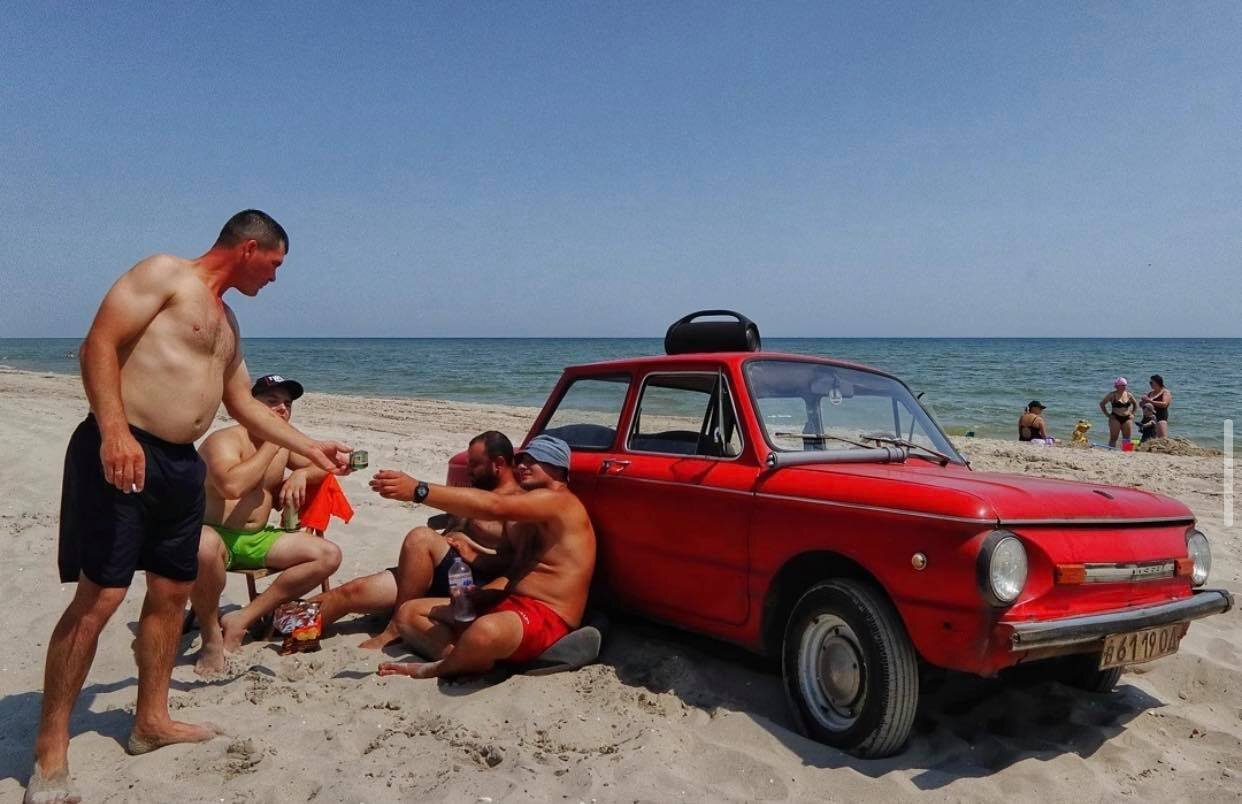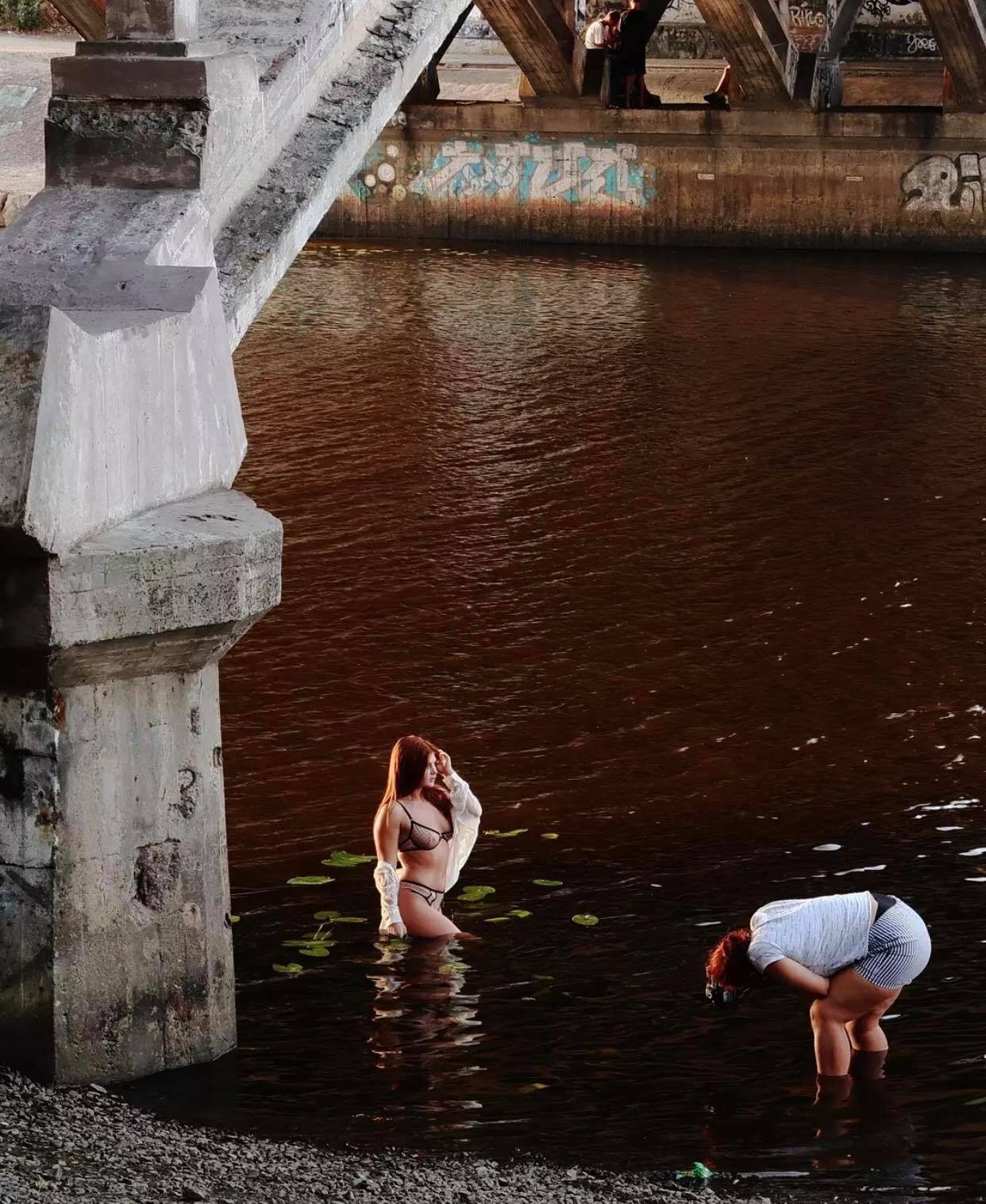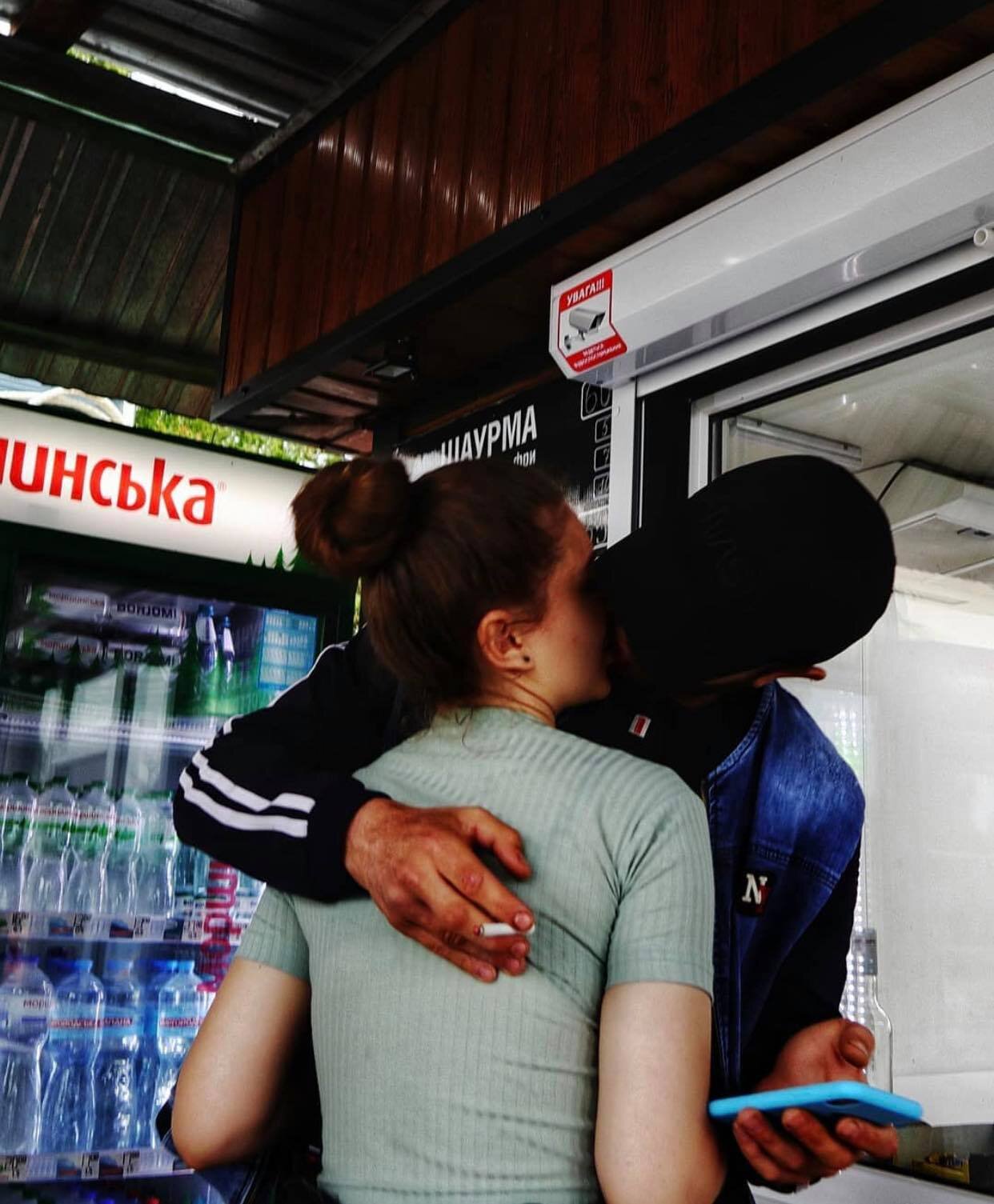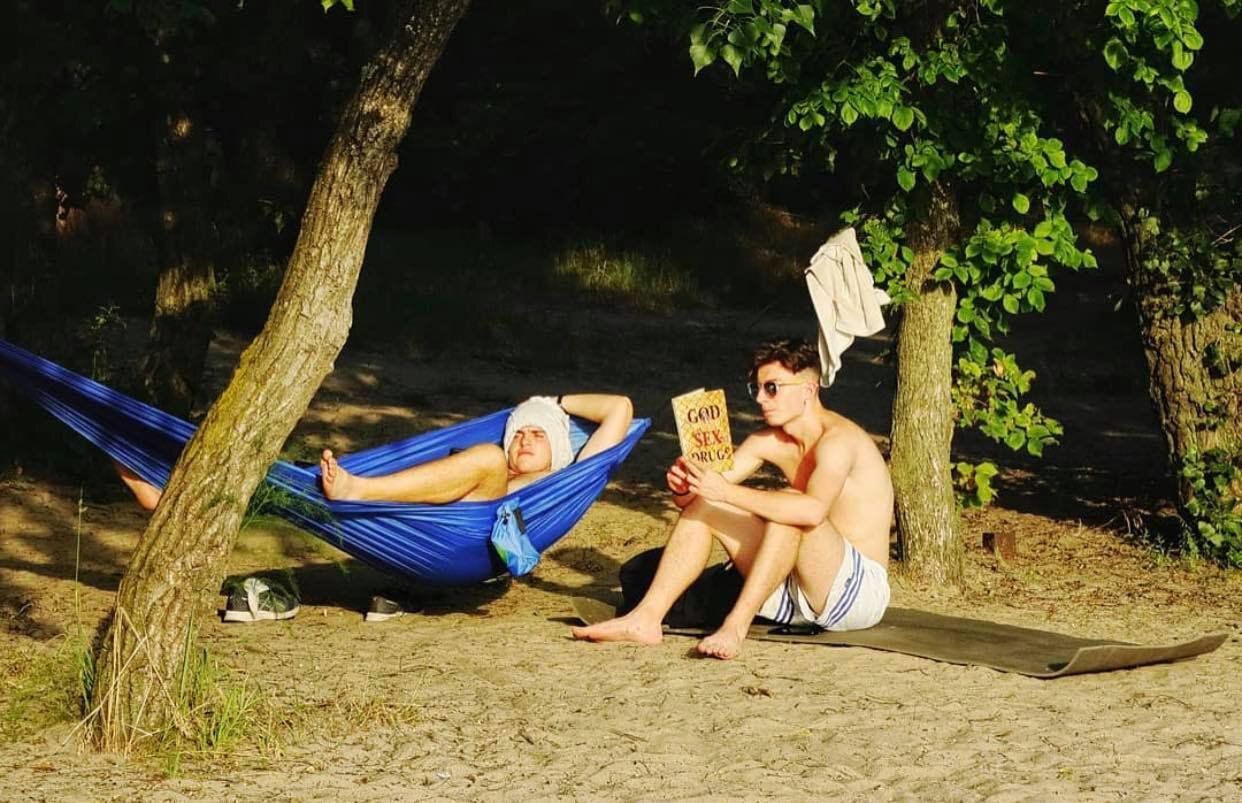"Hitchhiking and life on the road got me into writing": An Interview with Artem Chapeye
An author of both creative nonfiction and popular fiction, Artem Chapeye was born and raised in the small Western Ukrainian city of Kolomyya and has spent much of the last twenty years living in Kyiv. He has authored four novels and four books of creative nonfiction, and is a co-author of a book of war reportage. A four-time finalist of the BBC Book of the Year Award, his recent collection 'The Ukraine' was one of three finalists in the award’s new nonfiction category in 2018. His work has been translated into seven languages, and has appeared in English in the Best European Fiction anthology and in publications such as Refugees Worldwide in translation by Marian Schwartz. Artem is a past recipient of the Central European Initiative Fellowship for Writers in Residence (Slovenia) and the Paul Celan Fellowship for Translators (Austria), as well as a finalist of the Kurt Schork Award in International Journalism.
Kate Tsurkan spoke with Artem Chapeye about his newfound passion for photography, how photography complements his writing, the portrayal of so-called 'ordinary' people in contemporary Ukrainian fiction, why he has been called 'the most American of Ukrainian writers', and the problem with talking about literary influences.
A handful of Ukrainian authors (i.e. Serhiy Zhadan, Yuri Andrukhovych, Irena Karpa, etc.) have musical side projects, but in the past year or so, you’ve taken up photography. How did it come about?
I’ve always been frustrated by my lack of skill in photography, so I decided to do something about it. I first started by taking photos that complemented texts I’ve written during my travels, but naturally I got carried away. I should have known better. As with literature, simply being “competent” is no longer enough. Now I am compelled to take the best photographs possible, so much so that photography is no longer a side project for me.
Your photos are very colorful, in every sense of the word. They capture scenes of ordinary people going about their daily lives in Ukraine. This led me to wonder if photographers like Saul Leiter have had an influence on your photographic eye.
Of course. At the very least, I stopped shying away from vertical frames thanks to Saul Leiter. Like any newby, I started with Henri Cartier-Bresson’s photographs, and after that I got into Robert Frank’s The Americans, only to discover that I’m more into color than black-and-white. This realization led me to Saul Leiter, William Eggleston, Alex Webb, and finally to Alec Soth, whose Sleeping by the Mississippi is a favorite if not the favorite.
Many of the great photographers in history took photos with a series in mind, and while a single photograph can stand out from the rest, together they form a narrative. Has that changed because of social media - can a single photograph tell us a story? Would you say that is a good or bad thing?
I’ve only begun venturing down this path, but it’s necessary to think about a set of work rather than standalone photographs. As Alec Soth put it, anyone can take a good photo, but creating a strong body of work is what makes a truly great photographer. However I still have a lot to learn.
What makes a good photograph?
My opinion on this matter is shaped by other photographers. As the Russian photographer Sergey Maximishin once put it, a good photograph must surprise you. It has to grab the viewer and, most importantly, it has to linger on in their memory.
One of your photographs went viral and you even chose it as the cover of your most recent book. Can we expect future projects where you experiment with both photography and writing together?
That is one of the main reasons why I started learning photography. I hope I can do it at some point. In the beginning I thought of photography as “complementing” a book, but I now increasingly see how photos possess their own narrative drive. Alec Soth’s Sleeping by the Mississippi is a great example of this. The problem which remains to be solved in my case is that the photos should not be weaker than the text, otherwise it’s not worth including them.





Photographs by Artem Chapeye. You can find more here.
I think what makes both your writing and your photography appealing is that they portray the lives of ordinary people. Would you say that this topic is explored deeply enough by contemporary Ukrainian authors?
I think such topics can never be explored deeply enough. Every “ordinary” person’s life is different, so the opportunities for storytelling are limitless. Then again, some Ukrainian authors are more interested in writing historical novels or speculative fiction. That’s fine–I myself have been working on some sci-fi.
Much of your early work falls into the genre of travel writing. You traveled through the United States and Latin America. Could you briefly share some impressions from those trips for English readers that have yet to encounter your work in translation?
Hitchhiking and life on the road got me into writing. In my early twenties I wandered through the US before heading down to Mexico and Central America. Being a poor person from a peripheral country, I had to find work along the way, which turned the trip into vagabonding rather than tourism, and led me to experience more extreme situations like deportations and relying on the kindness of strangers to get by. This translates well into literature. By the way, at the time I was lucky enough not to have the money for any camera so I had to write and describe everything I saw.
Among other things, I lived and worked in the predominantly black Ninth Ward in New Orleans for about nine months (not at one sitting though). I was a doorman at a blues bar and at a strip club. I worked as a carpenter’s apprentice, helping him rebuild parts of the city after Hurricane Katrina. I know Barry Buxter and his wife Gloria will probably never read this, but I just want to express my deep gratitude to this middle-aged black couple who treated me as if I were their son. I also lived together with undocumented workers from all over Central America whom the locals called “Mexicans” even though most of them were from Guatemala and Honduras.
After getting married, my wife and I moved to Mexico City, but working there full-time was quite different from the reckless lifestyle of a university dropout just bumming around. As time passes, I start to miss the US even more than Mexico, although I understand returning would probably poison the romantic memories of my precarious youth. My impressions were the things I saw “from below” rather than from inside American society. Staying with a group founded by an ex-Black Panther isn’t exactly the same as living in suburbia, is it?
How did Ukrainian readers respond to these texts? Would you say that Ukrainian readers have an interest in travel narratives, in discovering different cultures and perspectives?
My first book received somewhat of a cult following. One of my most pleasant experiences as an author was when I stayed in a provincial Ukrainian city via Couchsurfing and found a copy of my own book which was literally falling to pieces from being read so much. The pages of the book were bound together by transparent adhesive tape. I won’t generalize and say that all Ukrainians are interested in different cultures, but many young people here definitely are.
I know you are a fan of the Beatnik generation of writers. Is this part of what compelled you to visit America? Why do you think the collective oeuvre of these authors remains so appealing to readers?
I spent three years after school at a military university, as is often the case for young men from poor families. During that time–which I liken to feeling imprisoned–I discovered a pirated online copy of Jack Kerouac’s On the Road. After reading it, I bought a physical copy. Eventually, I enrolled in a normal university, but when a Ukrainian-American friend, Alisa, proposed traveling from Boston down to Latin America, of course I had to drop out and go. I never regretted that decision.
It seems like the works of the Beatniks (and others like the poets and musicians Bob Dylan, Johnny Cash, and later Tom Waits) somehow appeal to many people’s desire for less conventional lifestyles, knowing people from different strata of society, and, generally, the inconveniences of freedom.
You once told me that a translator called you “the most American of Ukrainian writers”. Why is that?
It was Joel “Il’ja” Rakos, an expat who showered me with enthusiasm about my writing, for which I’m grateful. He added “of course that in no way makes you an American writer”. You might ask him to clarify what he meant. As I see it, he was referring to my literary influences. One of my early works, for example, was a road novel titled Travels with Mamayota In Search of Ukraine, a shout out to Steinbeck’s Travels with Charley In Search of America. The influence of authors and books such as Faulkner, Huckleberry Finn, Moby-Dick, Vonnegut, and later Franzen’s The Corrections are obvious in my work.
Perhaps this resulted in what you call portraying ‘ordinary people’ (most of them turn out to be extraordinary after a closer look) and, I would say, aiming for “technical perfection” in the language. It goes without saying that I was also influenced by French, British, and Russian writers as well.
When it comes to discussions about literary influence, however, I’m bothered by the hold of “bigger” cultures over “smaller” ones. I call it the ressentiment of the periphery. Can you name a major American author that has been influenced by Ukrainian literature? By Albanian literature? Vietnamese literature? I think not. One of the characters of Orhan Pamuk's The Snow says that when, for example, a German poet writes poetry they do it “as a human being” or “in the name of humanity” but when a Kurdish poet does the very same, it’s called “ethnic poetry”.
In my first fiction novel, The Red Zone, the rich publisher asks the author for “colorisms” about the author’s poverty rather than ruminations about “the human condition”. Ironically, when my Ukrainian publisher at the time was signing the contract for the English translation of this book (the contract was never fulfilled by the Americans, but that’s another story) they said basically the same thing that was written in the novel itself: “You’re trying to write about the human condition but what they want from us is the exotic”.
Interviewed by Kate Tsurkan
Image credit: Nastya Telikova, taken from the author’s public Facebook